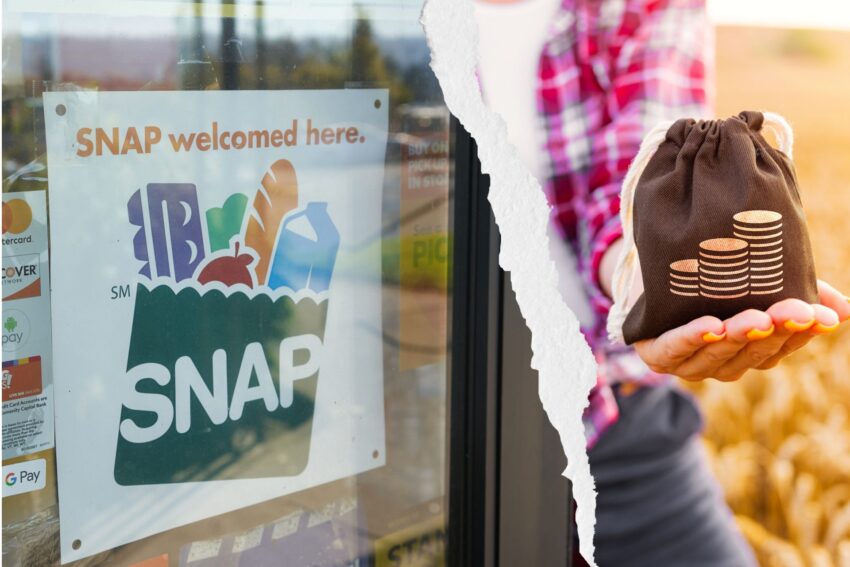It’s time to stop thinking about political plays as left vs right, but as the oligarchs on both sides of the aisle against the American people.
Across America, in the cities, suburbs, and countryside, a quiet famine is brewing. Come November 1, the Supplemental Nutrition Assistance Program (SNAP), the lifeline that feeds 41 million low-income Americans each month, will grind to a halt. No more $8 billion in federal food benefits. No more EBT cards reloading with the promise of a meal. This isn’t a glitch. It’s a calculated cutoff, courtesy of the ongoing government shutdown now stretching into its second-longest chapter in U.S. history. As the USDA’s website bluntly declares: “The well has run dry.” But why now? Why, in a nation drowning in agricultural abundance, are Americans going to be left without food? AgroWars digs into the dirt. Could this be less about fiscal cliffs and more about political power plays intended to cause chaos
What’s Really Happening with SNAP
Picture this: Families across the map, from Florida’s sun-baked suburbs to Tennessee’s rolling hills, staring at empty pantries as their October benefits evaporate. States like Colorado are scrambling to patch holes with their own funds, while the federal spigot is sealed shut. Unspent dollars from prior months might trickle over, but for most, that’s a drop in the bucket against rising grocery prices.
At the root? The 2018 Farm Bill’s expiration on September 30, 2025, left SNAP, a nutrition program awkwardly bundled with farm subsidies, in limbo. Congress’s failure to reauthorize it amid partisan gridlock has tied the hands of the Trump administration, which claims contingency reserves can’t bridge the November gap. Democrats are pushing emergency bills like the Keep SNAP Funded Act, but with the shutdown dragging on, it’s all theater in the Capitol’s coliseum. The result is a monthly harvest of hunger for one in eight Americans, many already teetering without family safety nets or community help.
SNAP’s marriage to the Farm Bill has long been a mismatched union. Ag giants squabble about crop insurance payouts while urban and rural poor fight for food. Untying them is the real reform we need, shifting nutrition aid to standalone legislation, untethered to agribusiness lobbying. But in this shutdown, it’s not just oversight. It’s opportunity.
The Power Plays: Foreign Bombs Over Domestic Bread
Here’s the bitter harvest. While SNAP withers, Uncle Sam’s checkbook is still wide open for overseas infernos. Since Russia’s 2022 invasion, the U.S. has funneled $130.6 billion into Ukraine’s defense. $20 billion in military hardware alone under the Ukraine Security Assistance Initiative. And Israel? A cool $38 billion military aid memorandum through 2028, with $16.3 billion rushed since October 2023’s war against Gaza, including $4 billion expedited under emergency powers. That’s billions for bombs and bullets, which politicians consider essential, and much more important than feeding Americans.
Why the disparity? Foreign aid buys alliances and headlines for hawks on both sides of the aisle. SNAP? It’s a “welfare” boogeyman, easy to slash for deficit hawks eyeing midterm optics. Both parties are using the shutdown as leverage, but the right wing seems to think it can starve the beast of social spending to force concessions on immigration and taxes. They want to get Americans off “handouts,” even if it means millions relying on taxpayer dollars today face destitution tomorrow.
Critics whisper of deeper designs, though. Idealism aside, reality bites. Job losses, inflation, and frayed networks have left too many without fallback fields. Cutting SNAP doesn’t cultivate self-reliance. It cultivates desperation.
What Happens When the Pantry Runs Dry?
What do hungry people do? History’s grim ledger offers clues. They forage, they ration, they revolt. In the short term, food banks will buckle under a 41-million-person surge, with pantries already reporting 20% spikes in demand. Kids skip school lunches, malnutrition climbs, and ERs fill with diet-related woes. Long-term? Crime ticks up. Shoplifting for sustenance, not sport. And mental health craters.
The real yield is chaos. Protests that started over immigration raids could morph into bread riots, echoing the 2020 unrest but laced with literal hunger pangs. Are D.C. strategists sowing these seeds deliberately? A cynic might say yes, as controlled crises justify crackdowns, rally the base around “law and order,” and distract from ballooning deficits elsewhere. After all, fear fertilizes control.
Guarded Gates: National Troops on the Horizon of Hunger
Timing is everything in this tilled plot. Just as SNAP’s axe falls, National Guard units have already rolled into Democratic strongholds: Los Angeles, Washington D.C., Portland, Chicago, Memphis. President Trump’s deployments, framed as bulwarks against “protests over immigration raids,” now cast long shadows over food-scarce streets. Legal salvos fly from states like Illinois, suing to block out-of-state troops as a violation of sovereignty. Trump himself escalates: “More than National Guard” if cities don’t comply.
Coincidence? Or choreography? With hunger hitting hardest in urban cores, many guarded by blue mayors, the optics scream preemption. Deploy now, blame unrest on “entitled” recipients later. It’s a harvest of division, with troops to quell the chaos the politicians planted, all while foreign aid flows unchecked. Cities and towns are bracing for what’s to come.
Reaping Reform: Beyond the Shutdown Scythe
SNAP’s woes spotlight a rotten root. Over-reliance on aid isn’t sustainable, nor is it a choice for millions battered by wage stagnation and safety-net shreds. Taxpayer-funded survival is a band-aid on systemic blight. It’s better to invest in jobs, address affordable housing, and develop ag policies that don’t just fatten corporate silos. Untether SNAP from the Farm Bill’s agribusiness yoke. Make it a standalone program against hunger, not a bargaining chip.
Yet, in this November void, will violent conflict prevail? Given our politicians’ love for spending our treasure and spilling American blood in foreign wars, it appears that these chickens are coming home to roost. One thing’s clear: starving a nation doesn’t secure it. It sows the seeds of chaos and revolt. It’s time to harvest solutions, before the storm breaks.


